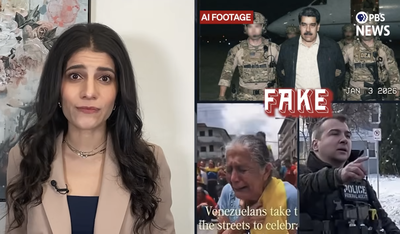NOTE: If you are short on time, watch the video and complete this bell ringer activity: What did you notice? What did the story make you think about? What would you want to learn more about?
SUMMARY
In recent years, people have become more comfortable sharing their personal experiences about mental health, a sign that stigma around it is diminishing. On Instagram and TikTok combined, there are nearly 90 million posts with the hashtag “mental health.” But not all the information online is accurate. Stephanie Sy speaks with licensed psychologist Taisha Caldwell-Harvey to learn more.
View the transcript of the story.
News alternative: Check out recent segments from the News Hour, and choose the story you’re most interested in watching. You can make a Google doc copy of discussion questions that work for any of the stories here.
WARM-UP QUESTIONS
- Who is Taisha Caldwell-Harvey, and what is her background?
- Why is it harmful to label everyday emotional experiences as clinical disorders, according to Caldwell-Harvey?
- What is driving the rise of mental health misinformation and self-diagnosis on social media?
- How can we address this problem and promote more responsible conversations around mental health online, according to Caldwell-Harvey?
- When might social media posts about mental health be helpful, and when might they be misleading?
FOCUS QUESTIONS
- In your opinion, what makes a social media post seem trustworthy, and how is that different from it actually being trustworthy?
- What responsibilities do influencers and content creators have when posting about serious topics like mental health?
Media literacy: What role does the lack of clear authority or credentials on social media play in the spread of mental health misinformation? How can we critically evaluate the credibility of creators who share mental health advice?
WHAT STUDENTS CAN DO
Assignment: Find three social media posts related to mental health. These can be from platforms like TikTok, Instagram, Twitter or Facebook.
For each post, carefully note the information or claims being presented and identify who posted it.
Next, use credible sources such as the World Health Organization website and the National Institute of Mental Health website to fact-check the information shared in each post. Compare the claims in the social media posts with information from these trusted sources to determine whether the posts are accurate, misleading, or false.
Write a one-page reflection addressing the following:
- For each social media post you examined, describe what you found when comparing its information to credible sources
- Describe any challenges you faced in fact-checking or organizing your findings
- Explain what strategies you will use in the future to carefully evaluate information you find on social media
Written by Brooke Ingemi, PBS News Hour Classroom's intern and senior at Amherst College, and News Hour's Luke Gerwe.
Fill out this form to share your thoughts on Classroom’s resources.





